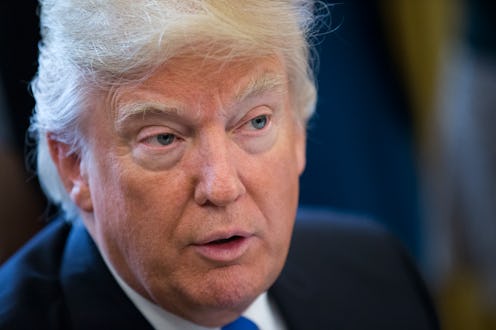News
Trump Shouldn't Be Able To Rule On DAPL

If you've been following the struggle between members of the Standing Rock Sioux tribe and supporters of the proposed Dakota Access Pipeline, then you've probably heard what happened. On the fifth day of his young tenure, President Trump signed an executive order approving the continuation of the construction of the Dakota Access Pipeline, and it's stirred up a storm of criticism and controversy. And ethics concerns, too ― Trump shouldn't be allowed to push through DAPL without first proving, with hard evidence, that he indeed sold off his stock in the company behind the pipeline, Energy Transfer Partners.
The possibility that Trump is suffering from a conflict of interest relating to the pipeline deal has been raised since his victory in the 2016 presidential election back on Nov. 8, 2016. In December, CNBC reported a Trump spokesperson's claim that the real estate mogul had sold off his stock in the company, so to avoid any appearance of such a conflict. Bustle has reached out to the Trump administration for comment on whether the president will release any documentation that conclusively proves he sold the stock.
But a simple spokesperson's statement is not evidence, not by a long shot. It's also true that ETP CEO Kelcy Warren reportedly donated $100,000 to a joint Trump/Republican Party fundraiser during the campaign ― Trump's current White House Director of Strategic Communications Hope Hicks claimed to CNBC that the donation would not affect the president's decision-making on the DAPL.
It's not solely the stock that has people's eyes bugging out about this executive order, however. It's also the fact that Trump's pick for energy secretary, former Texas governor Rick Perry, actually sat on the board of ETP. Not in the present, to be clear, but the very recent past ― he resigned that job earlier this month, as he prepared for his confirmation hearing to head up the Department of Energy.
Simply put, for an issue that's so inflammatory and controversial, and is virtually assured to incite the same sort of staunch and unrelenting protest and civil disobedience that was seen last year, the question of whether the president of the United States has financial holdings in a company that stands to directly benefit from the construction of the DAPL must be answered. And not just because of the DAPL ― it's as much about this particular issue as it is what the Trump administration's attitude is toward the myriad, almost endless list of potential conflicts Trump's business empire and holdings pose.
Trump himself claimed in a press gathering earlier this month that he handed off control of his businesses to his two sons, Don Jr. and Eric. It's since been reported by NPR that the documents severing him from management of his businesses have been filed, though he is still listed as their owner.
The implications of him continuing to own his businesses without managing them is yet unclear. But if he derives any monetary benefit whatsoever from his dealings from before he was president, he could potentially be subject to serious constitutional issues.